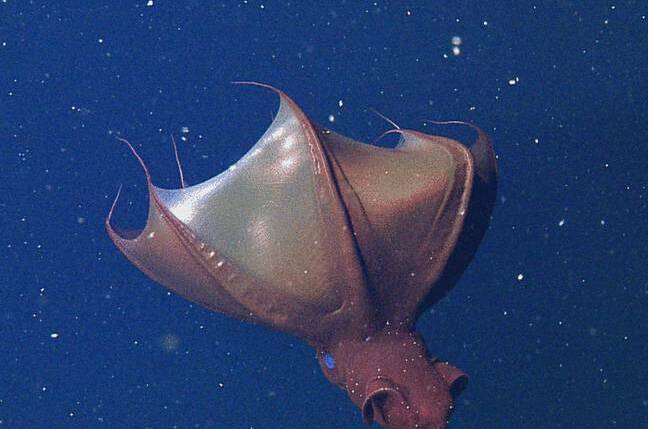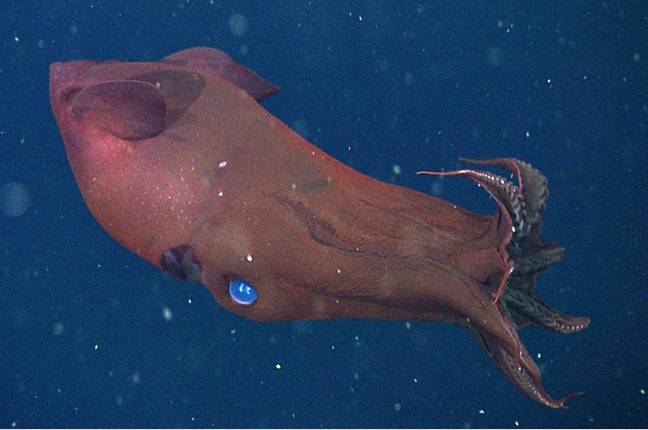Be Introduced to The Vampire Squid and Unique Sex Lives of the Deep
 Pic Scientists studying vampire squid have discovered the weird creatures of the vasty deep are unique among their class in the way they reproduces.
Pic Scientists studying vampire squid have discovered the weird creatures of the vasty deep are unique among their class in the way they reproduces.
Cephalopods, which include squid and octopuses, breed at the very end of their life cycles, funneling all their energy into creating eggs that are released shortly before the parent dies.
But vampire squid – found in oxygen-poor environments 600 to 900 metres (2,000 to 3,000 ft) below the sea surface – manage to get frisky with their partners many, many times throughout their lives.
"Their slow mode of life seems insufficient to support one big reproductive event, unlike other coleoid cephalopods," said Henk-Jan Hoving of the GEOMAR Helmholtz Centre for Ocean Research Kiel in Germany, who published the findings in the journal Current Biology.
"Perhaps it is therefore that vampire squid return to a gonadal resting phase after spawning, and presumably start accumulating energy for a new reproductive cycle."
 The team examined the corpses of 43 female vampire squid, and found that some not only had eggs ready to go, but had already spawned multiple times. One female, assuming an average batch of 100 eggs per session, had spawned 38 times, and had eggs in reserve for at least 60 more spawning episodes.
The team examined the corpses of 43 female vampire squid, and found that some not only had eggs ready to go, but had already spawned multiple times. One female, assuming an average batch of 100 eggs per session, had spawned 38 times, and had eggs in reserve for at least 60 more spawning episodes.
Vampire squid are certainly odd beasts. Unique among cephalopods, they don't hunt for live prey, but feed on nutrients and food scraps as they pulse through the water. Its eight legs are linked by skin membranes, giving it the cloaked appearance that gives the creature its name.
The scientists speculate that the low levels of food and oxygen in very deep seas have forced vampire squid into a more slow and sustainable lifestyle, and that is reflected in its sex life.
"We know very little about deep-sea organisms and their life-cycle patterns, in particular in the water column of the deep sea. The patterns we know from coastal and shallow-water organisms may not apply to deep-sea species," Hoving said.
"We need to enhance our knowledge of deep-sea pelagic organisms and the system they are part [of], since the pelagic deep sea is the largest living space on the planet. A better understanding of this unique marine ecosystem will eventually allow for better development of management and conservation strategies.” ®
theregister.co.uk
But vampire squid – found in oxygen-poor environments 600 to 900 metres (2,000 to 3,000 ft) below the sea surface – manage to get frisky with their partners many, many times throughout their lives.
"Their slow mode of life seems insufficient to support one big reproductive event, unlike other coleoid cephalopods," said Henk-Jan Hoving of the GEOMAR Helmholtz Centre for Ocean Research Kiel in Germany, who published the findings in the journal Current Biology.
"Perhaps it is therefore that vampire squid return to a gonadal resting phase after spawning, and presumably start accumulating energy for a new reproductive cycle."

"Is that an egg sac in your tentacles or are you just pleased to see me?"
Vampire squid are certainly odd beasts. Unique among cephalopods, they don't hunt for live prey, but feed on nutrients and food scraps as they pulse through the water. Its eight legs are linked by skin membranes, giving it the cloaked appearance that gives the creature its name.
The scientists speculate that the low levels of food and oxygen in very deep seas have forced vampire squid into a more slow and sustainable lifestyle, and that is reflected in its sex life.
"We know very little about deep-sea organisms and their life-cycle patterns, in particular in the water column of the deep sea. The patterns we know from coastal and shallow-water organisms may not apply to deep-sea species," Hoving said.
"We need to enhance our knowledge of deep-sea pelagic organisms and the system they are part [of], since the pelagic deep sea is the largest living space on the planet. A better understanding of this unique marine ecosystem will eventually allow for better development of management and conservation strategies.” ®
theregister.co.uk
Comments